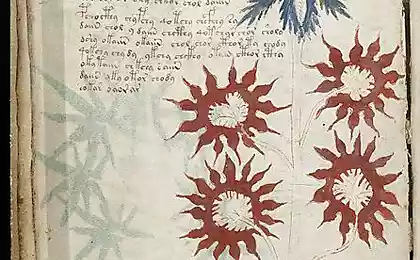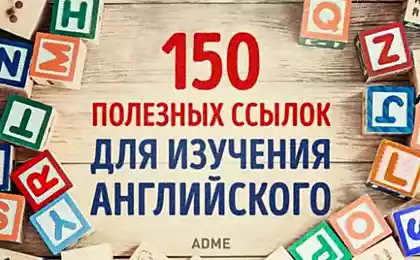199
What is the peculiarity of spelling some words
You repeat the same word a hundred times and you don’t realize it’s the wrong thing to do. Others may not notice either. Because on hearing, it's okay, but on paper, it's not. Editorial "Site" It offers to understand the peculiarity of spelling some words and why they make mistakes.

Some words just need to be remembered, it is unlikely that you will remember the rules by which they are written. In turn, we will try to give you hints, because the words are insidious, and the Russian language is rich and difficult. Let's see what we can do to rule out misuse.
What is the peculiarity of spelling 1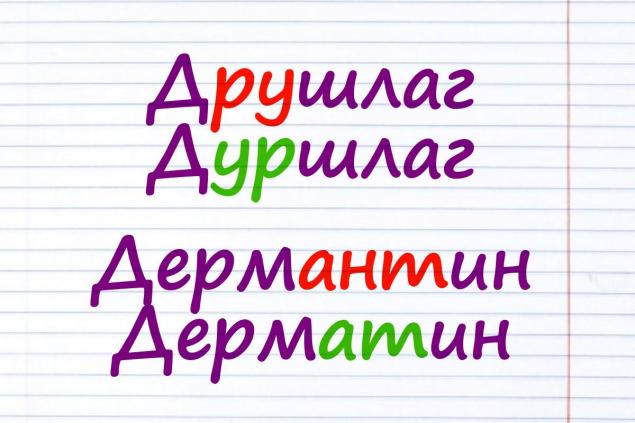
More than once, I caught myself thinking that I heard a “crash.” Of course it's wrong. You can check with the German word “durch”, which translates as “through or through”. When you write, just remember that.
The word “dermatin” is derived from the Greek “derma”, but for some reason everyone tries to add the letter “n” to get “dermantine”. It's a mistake. I've allowed her myself.
2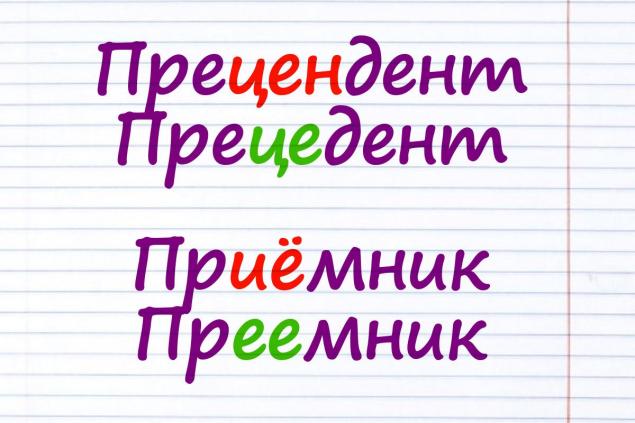
If you know the origin of the word "precedent", then, probably, you can get rid of the obsessive desire to shove an extra "n" and here - "precedent." “Precedent” is a French word that translates as “preceding.”
The word “successor” means a person who adopts. "Pre" is a console. So stop calling the successor "receiver."
3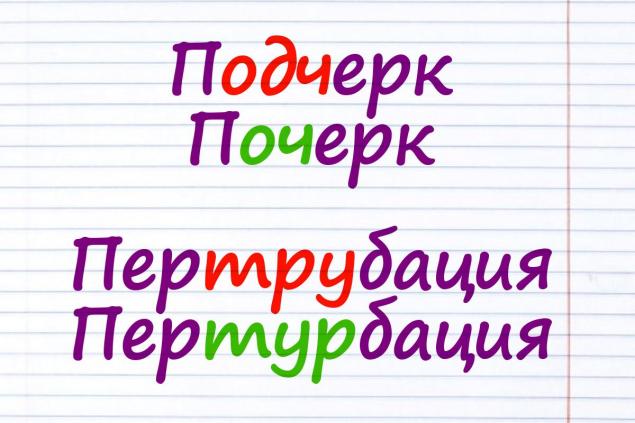
The word “handwriting” is hard to spell wrong, but some do. What is the peculiarity of spelling? The test word is “brick”, not “underline”. Clear as day!
“Pertrubization” is not the toughest option. A word about which to break your tongue came to us from Latin. “Perturbatio” means a sudden disruption of the normal course of events. Remember and use it for your health.
4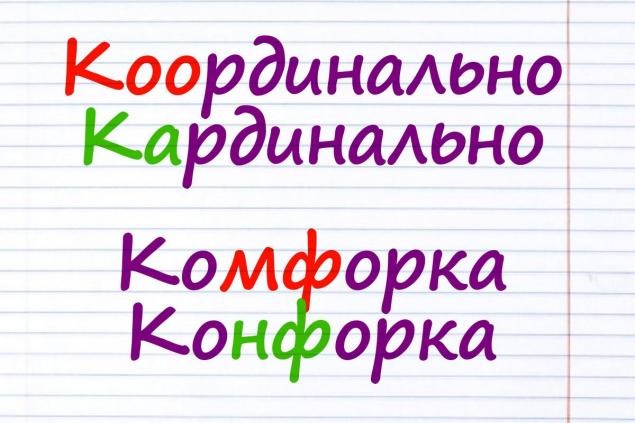
And Latin again! The beautiful word “cardinalis” (translated as “main”, “main”) to “coordinates”, from which, apparently, connoisseurs are trying to build a word, has no relation. Don't thank me.
The funniest thing is that the original version of "comfort" was correct, as the word comes from the Dutch "comfoor". In Russian it is translated as “roast” or even “mangal”. Then the rules changed, and now the correct option is the one in which there is “n”.
5 243296
The peculiarity of spelling is that the word "linoleum" consists of two Latin - "linum" and "oleum", which translates as "canvas" and "oil". In syllables. Li-no-le-um. You don’t need to change the “and” and “e”, it’s wrong.
Exactly the same as with linoleum. No venigret! In French, there is the word "vinaigrette", "sauce of vinegar and oil", which became the name for the dish. That's why "vinegret" is right.
6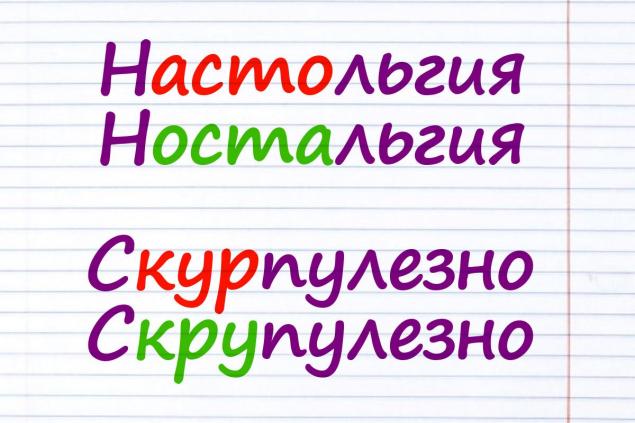
Nostalgia is written this way. The word comes from the ancient Greek, “nostos” means “coming home,” and “algos” means “pain” or “suffering.” For the first time found life in German and from there came to Russian. We know it as the psychological term nostalgie.
The word “strictly” is to blame for the accumulation of consonant letters, because of which the speech apparatus automatically tries to insert a consonant. Therefore, you can hear “scrupulously”, it even sounds more harmonious. It's wrong. The basis of the Latin word is “skrupulus”, which means “rocky”, “sharp pebble”. The mediator was the French scrupuleu.
7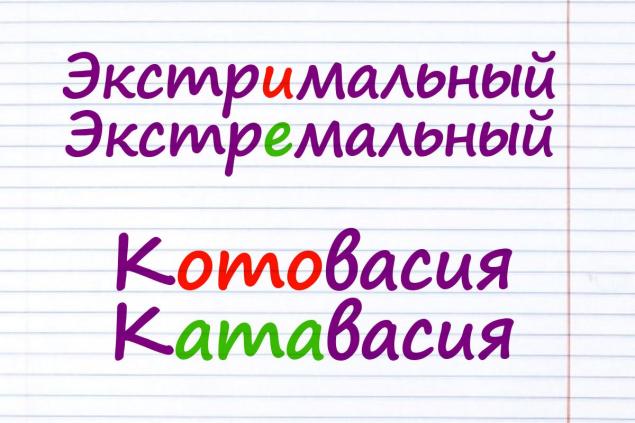
The catch lies in the words “extreme” and “extreme”. They both came to Russian from different languages: a noun from English “etreme”, and an adjective from Latin “etremus”. It is the test, while English is written by us according to pronunciation. I hope I understand.
Catavasia is really complicated. In colloquial language, the word came from the jargon of seminarians. The fact is that when you sing katavasia (church chants, here is the real meaning of the word) at the same time two choirs came together, it turned out quite indistinct, even if everyone sang correctly. So came the meaning of confusion or confusion, and the neighbor’s cat Vaska, of course, absolutely nothing to do with it.
8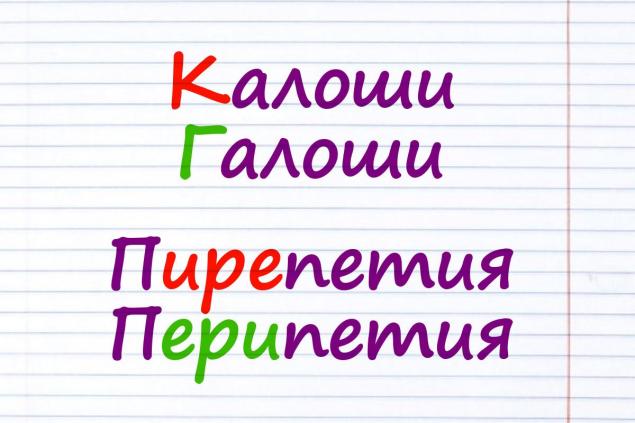
Kaloshi and galoshi. In fact, both options are true. Although “kaloshi” is considered an outdated word, it is used in full. The etymology of the word is not fully understood, we only know that came "galoshes, galoshen" either from French or from German. According to one theory, our people attached local "cal" (mud, grounds), so there were "kaloshi", and later they began to use correctly - "galoshi". Here we go.
The word "peripetia", of course, can be difficult: often we hear and see "pirepetia". Check through the Greek "peripeteia", which means a sudden turn in fate or some complications. This is the best time to remember a word.
That's so much fun! We sincerely believe that you enjoyed joining our lesson. If you want to continue to improve your literacy, then continue to study in our other material, you can withdraw useful or just remember what you know. In the meantime, share the article with others and never be discouraged!

Some words just need to be remembered, it is unlikely that you will remember the rules by which they are written. In turn, we will try to give you hints, because the words are insidious, and the Russian language is rich and difficult. Let's see what we can do to rule out misuse.
What is the peculiarity of spelling 1

More than once, I caught myself thinking that I heard a “crash.” Of course it's wrong. You can check with the German word “durch”, which translates as “through or through”. When you write, just remember that.
The word “dermatin” is derived from the Greek “derma”, but for some reason everyone tries to add the letter “n” to get “dermantine”. It's a mistake. I've allowed her myself.
2

If you know the origin of the word "precedent", then, probably, you can get rid of the obsessive desire to shove an extra "n" and here - "precedent." “Precedent” is a French word that translates as “preceding.”
The word “successor” means a person who adopts. "Pre" is a console. So stop calling the successor "receiver."
3

The word “handwriting” is hard to spell wrong, but some do. What is the peculiarity of spelling? The test word is “brick”, not “underline”. Clear as day!
“Pertrubization” is not the toughest option. A word about which to break your tongue came to us from Latin. “Perturbatio” means a sudden disruption of the normal course of events. Remember and use it for your health.
4

And Latin again! The beautiful word “cardinalis” (translated as “main”, “main”) to “coordinates”, from which, apparently, connoisseurs are trying to build a word, has no relation. Don't thank me.
The funniest thing is that the original version of "comfort" was correct, as the word comes from the Dutch "comfoor". In Russian it is translated as “roast” or even “mangal”. Then the rules changed, and now the correct option is the one in which there is “n”.
5 243296
The peculiarity of spelling is that the word "linoleum" consists of two Latin - "linum" and "oleum", which translates as "canvas" and "oil". In syllables. Li-no-le-um. You don’t need to change the “and” and “e”, it’s wrong.
Exactly the same as with linoleum. No venigret! In French, there is the word "vinaigrette", "sauce of vinegar and oil", which became the name for the dish. That's why "vinegret" is right.
6

Nostalgia is written this way. The word comes from the ancient Greek, “nostos” means “coming home,” and “algos” means “pain” or “suffering.” For the first time found life in German and from there came to Russian. We know it as the psychological term nostalgie.
The word “strictly” is to blame for the accumulation of consonant letters, because of which the speech apparatus automatically tries to insert a consonant. Therefore, you can hear “scrupulously”, it even sounds more harmonious. It's wrong. The basis of the Latin word is “skrupulus”, which means “rocky”, “sharp pebble”. The mediator was the French scrupuleu.
7

The catch lies in the words “extreme” and “extreme”. They both came to Russian from different languages: a noun from English “etreme”, and an adjective from Latin “etremus”. It is the test, while English is written by us according to pronunciation. I hope I understand.
Catavasia is really complicated. In colloquial language, the word came from the jargon of seminarians. The fact is that when you sing katavasia (church chants, here is the real meaning of the word) at the same time two choirs came together, it turned out quite indistinct, even if everyone sang correctly. So came the meaning of confusion or confusion, and the neighbor’s cat Vaska, of course, absolutely nothing to do with it.
8

Kaloshi and galoshi. In fact, both options are true. Although “kaloshi” is considered an outdated word, it is used in full. The etymology of the word is not fully understood, we only know that came "galoshes, galoshen" either from French or from German. According to one theory, our people attached local "cal" (mud, grounds), so there were "kaloshi", and later they began to use correctly - "galoshi". Here we go.
The word "peripetia", of course, can be difficult: often we hear and see "pirepetia". Check through the Greek "peripeteia", which means a sudden turn in fate or some complications. This is the best time to remember a word.
That's so much fun! We sincerely believe that you enjoyed joining our lesson. If you want to continue to improve your literacy, then continue to study in our other material, you can withdraw useful or just remember what you know. In the meantime, share the article with others and never be discouraged!
The skill of growing tomatoes and how to feed tomatoes when planting
Date palm from the bone and how to grow it at home
